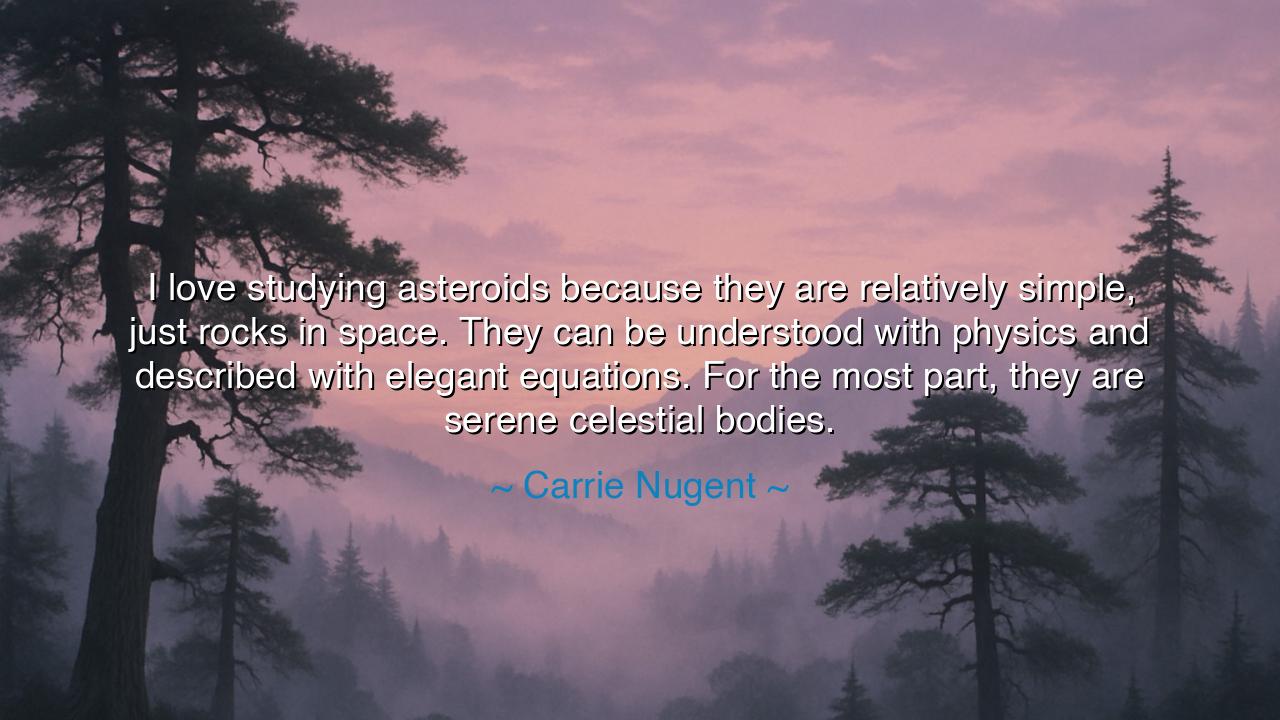
I love studying asteroids because they are relatively simple
I love studying asteroids because they are relatively simple, just rocks in space. They can be understood with physics and described with elegant equations. For the most part, they are serene celestial bodies.






Hearken, O seeker of wisdom, to the words of Carrie Nugent: “I love studying asteroids because they are relatively simple, just rocks in space. They can be understood with physics and described with elegant equations. For the most part, they are serene celestial bodies.” This is no idle utterance, but a teaching of balance, of reverence for the harmony of the universe, and of the peace that arises from simplicity.
When she speaks of asteroids as “just rocks in space,” she is not diminishing their worth but unveiling a profound truth. In their quiet drift through the heavens, these stony travelers embody simplicity unadorned. They are free from the entanglements of human ambition, politics, and vanity. Their essence can be grasped by the steady hand of physics, their being traced with the gentle strokes of equations. The ancient philosophers taught that truth is often clothed in the plainest garb; here too, a fragment of stone wandering the void holds within itself the whispers of eternity.
And yet, this simplicity is not without majesty. To the untrained eye, they are but cold fragments, forgotten remnants of creation. But to one who beholds with wonder, these celestial bodies are serene messengers of cosmic order. Like monks who retreat into the silence of mountains, asteroids abide in patience, speaking in the language of orbits and gravity. Their serenity is a rebuke to our restlessness, teaching us that stillness too has a purpose, and that peace is a form of wisdom.
Consider the story of Galileo, who in the seventeenth century turned his telescope upon the night sky. Where others saw only unchanging spheres, he discerned movement, moons circling Jupiter, and the flawed surface of our own Moon. In his time, such revelations threatened the proud towers of human certainty. Yet Galileo, like Nugent, found joy in the clarity of the cosmos, in describing nature’s secrets with equations rather than dogma. Just as Galileo’s observations altered the destiny of knowledge, so too does the study of asteroids remind us that even the smallest stones drifting in the void may shift the course of worlds.
Thus, the quote is more than admiration of rocks; it is a hymn to order and beauty, to the elegance hidden in what appears plain. The ancients declared that harmony resided in numbers, that the music of the spheres was sung in ratios and measures. Nugent echoes their voices when she declares that asteroids “can be understood with physics.” To her, as to them, mathematics is not cold calculation but the poetry of the universe, a script written by creation itself.
Let us then take this lesson into our lives. For do we not also clutter our days with needless complexities? Are we not often shaken by storms of desire, ambition, and noise? If we seek to live well, let us be as the asteroid: simple, steadfast, serene. Let us strip away what is unnecessary, embrace what can be known and understood, and move with calm purpose in our appointed orbit.
Therefore, I say to you: cultivate simplicity. Practical action lies before you—clear your space of what does not serve, choose clarity over confusion, and learn to see beauty in the humble. As the asteroid drifts quietly yet purposefully through the heavens, so too can you move through life with calm, guided by the elegant equations of patience, discipline, and peace. In this way, you will not be lost in the chaos of the world but will shine, serene and eternal, like a celestial body in the night sky.






AAdministratorAdministrator
Welcome, honored guests. Please leave a comment, we will respond soon